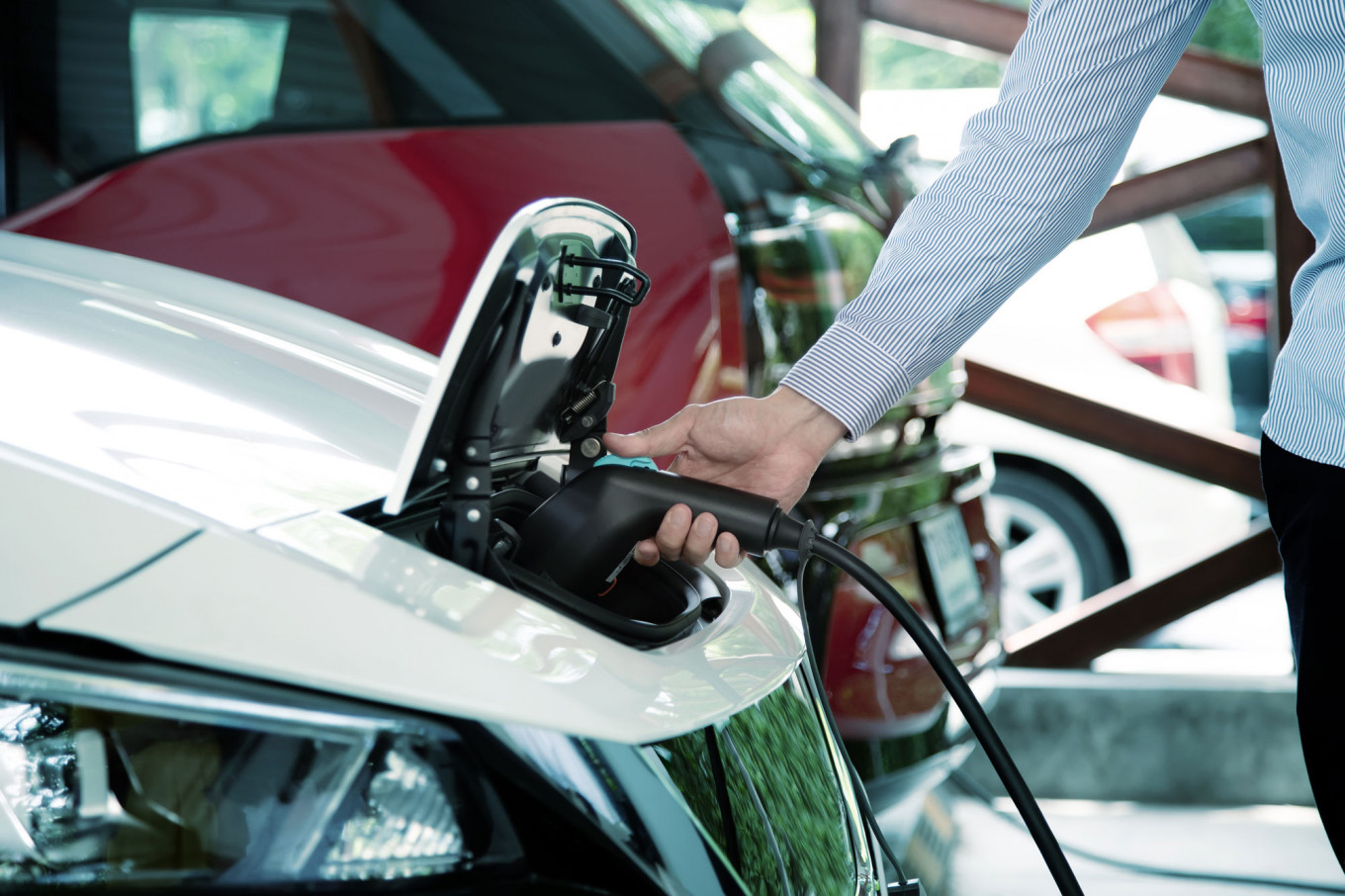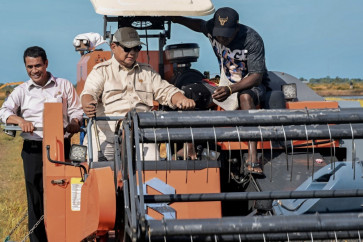Popular Reads
Top Results
Can't find what you're looking for?
View all search resultsPopular Reads
Top Results
Can't find what you're looking for?
View all search resultsTriple benefits from Indonesia’s global EV aspirations
Change text size
Gift Premium Articles
to Anyone
C
ountries worldwide are rapidly shifting from internal combustion engines (ICE) to electric vehicles (EV) as part of their strategy for lowering carbon emissions. Indonesia, on its part, aspires to plant its feet on the global stage amid such a shift.
Well-endowed with vast reserves of nickel, the largest at 22 percent of global reserves, Indonesia’s nickel output already has far outpaced other countries at 1 million tons per year. To put it into context, Indonesia alone contributed to about 30 percent of global production.
The country is expected to maintain its top rank in the years to come, with annual nickel production projected to increase to 4.5 million tons within five years. At the moment, the stainless steel industry consumed around two-thirds of the global nickel supply, but the battery industry is catching up fast.
According to an HSBC study, EV adoption rate worldwide will rise to 27 percent in 2025 from just 8 percent in 2021. The number is expected to climb further to 53 percent in 2030 and 73 percent in 2035. Indonesia sits at the heart of this revolution, benefitting on at least three fronts.
Driving FDI and exports
In January 2020, President Joko Widodo enforced an export ban on nickel to ensure a stable supply of the mineral for domestic smelting. The government has also simplified the mining permit process and offered fiscal incentives for smelter developments.
Since then, major companies seeking to tap into the rising popularity of EV have been flocking into the country. South Korea’s LG Group, China’s CATL, CNGR, Huayou, and Taiwan’s Foxconn are among the household names pledging billions of dollars in nickel processing and battery manufacturing. German’s BASF and France’s Eramet are finalizing their investment plan for a nickel smelter in the country.
The Ministry of Investment/BKPM estimated investment potential from downstream policies in the mineral sector, including nickel and coal, amounting to US$427.1 billion by 2035.
Thanks to the higher value of processed concentrates, export proceeds from nickel jumped to US$20.9 billion in 2021 from just US$1.1 billion in 2014. President Jokowi expects export receipts of nickel to exceed US$30 billion this year , a major boon for state coffers.
Indonesia plans to copy its nickel playbook into bauxite, with a proposed export ban later this year. The country wants to turn bauxite into alumina, and eventually aluminum. The latter is also an important material for EV batteries.
Add that to the country’s reserve of cobalt, used to extend EV battery life, and Indonesia looks primed to become a major hub for EV battery production.
“Indonesia is the largest nickel producer in the world and it plans to increase production to 4.5 million tons annually in the next 5 years. Furthermore, it is also exciting to see the efforts from the Indonesian government to attract investment for building an extensive EV value chain with a focus on high-value activities,” said Francois de Maricourt President Director at PT HSBC Indonesia.
“As Indonesia’s EV industry continues to grow, Indonesia can potentially become a key player in EV global supply chain,” Maricourt added.
End-to-end EV ecosystem
Government efforts in creating an end-to-end ecosystem are starting to show substantial gains. Authorities are in talks with US EV maker Tesla and Chinese electric car producer BYD to set up a manufacturing facility in the country, while German’s VW and US carmaker Ford are exploring opportunities to tap the country’s battery potential.
The presence of these global car giants will complement China’s SGMW (Wuling) and South Korea’s Hyundai existing assembly lines. Led by Wuling and Hyundai, as well as Japanese hybrid models, EV sales in 2022 crossed 20,000 units, a six-fold jump from 2021.
The government’s plan to introduce incentives for EV buyers as well as lower-priced models will help boost EV sales to exceed 50,000 units this year, according to Fitch Ratings.
But, to truly create a holistic EV ecosystem in the country, a significant ramp-up in charging stations is needed, according to HSBC. The number of charging stations totaled 570 at the end of 2022, less than one-tenth of over 6,700 petrol stations spread across the country.
The after-sales service for EV as well as stronger regulatory frameworks will be required to boost the domestic EV market.
“While challenges remain in the downstream sector, such as the limited infrastructure of charging stations and availability of after-sales services, the development of the EV ecosystem is expected to play a role in supporting Indonesia’s ambition for net-zero emissions by 2060,” said Riko Tasmaya, Global Banking Managing Director at PT HSBC Indonesia.
Help achieve Net Zero Target
An aggressive shift to EV adoption will help Indonesia to lower its overall emissions. The government last year showed an increased ambition in lowering greenhouse gas emissions, increasing its carbon reduction goal to 32 percent by 2030 from 29% previously.
Achieving the Net Zero Target by 2060 requires great efforts in multiple sectors, such as forestry and energy, but the Indonesian government has shown great strides. A strong push to create an end-to-end EV ecosystem will create numerous business opportunities as the country moves up in the global supply chain, while at the same time helping Indonesia achieves its climate cause.
“HSBC is proud to host an investment forum that focused on the strategic investment roadmap for Indonesia’s nickel & EV industrial outlook, featuring views from government and industry players,” said Tasmaya.
The forum, held on March 8 in collaboration with the German-Indonesian Chamber of Commerce and Industry, brought together participants across various fields, from research and consultancy firms to upstream and midstream mining companies to EV manufacturers.
Such an event also served as a crucial avenue to connect participants from various industries with Indonesian policymakers, highlighting HSBC’s unique position in leveraging its international and on-the-ground presence.
“Partnering with institutions like HSBC can help navigate the dynamic and exciting opportunities in this emerging Southeast Asian powerhouse. Let’s challenge the convention and work together to drive the growth of the EV industries in Indonesia and beyond,” Tasmaya added. (ism)










